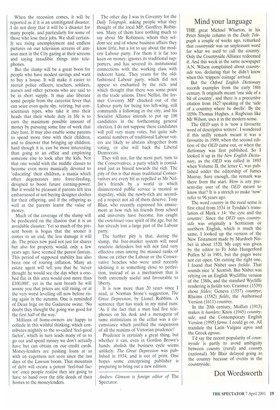Mind your language
THE great Michael Wharton, in his Peter Simple column in the Daily Telegraph a couple of weeks ago, remarked that countryside was an unpleasant word for what we used to call the country. Only the Countryside Alliance redeemed it. And this week in the same newspaper A.N. Wilson complained about counnyside too, declaring that he didn't know when this 'trippers' coinage' arrived.
But the Oxford English Dictionary records examples from the early 18th century. It originally meant 'one side of a bit of country', and there is a precursive citation from 1627 speaking of the 'side of a countrey where he dwells'. By the 1850s Thomas Hughes, a Rugbeian like Mr Wilson, uses it in the modern sense.
The OED says it is 'now a favourite word of descriptive writers'. I wondered if this sniffy remark meant it was a favourite in 1989, when the second edition of the OED came out, or when the dictionary was first published. So I looked it up in the New English Dictionary, as the OED was called in 1893 when Volume II, the letter C, was published under the editorship of James Murray. Sure enough, the remark was there from the start. How is any present-day user of the OED meant to know that? It is a stretch to make 'now' refer to 96 years ago.
The word country in the rural sense is first cited from 1534 in Tyndale's translation of Mark v 14: 'the cyte and the countre'. Since the OED says countryside was originally a Scotticism or northern English, which is much the same, I looked up the version of the New Testament made by Murdoch Nisbet in about 1520. My copy was given by the editor to Fr John Hungerford Pollen SJ in 1901, but the pages were not cut open. On cutting the right one, I found that Nisbet uses feeldis. That sounds nice 'n' Scottish. But Nisbet was relying on an English Wycliffite version of the 1380s, and the standard Wycliffe rendering is feeldis too. Cranmer (1539) chose feldes; Geneva (1557) countrye; Rheims (1582) fields; the Authorised Version (1611) countrey.
In the 20th century, Moffatt (1913) makes it hamlets; Knox (1945) countryside; and the Contemporary English Version (1995) faints. I could go on. All translate the Latin Vulgate agros and the Greek agrous.
I'd say the recent popularity of counnyside is partly to avoid ambiguity between country (rural) and country (national). Mr Blair delayed going to the country because of events in the countryside.
Dot Wordsworth


























































 Previous page
Previous page